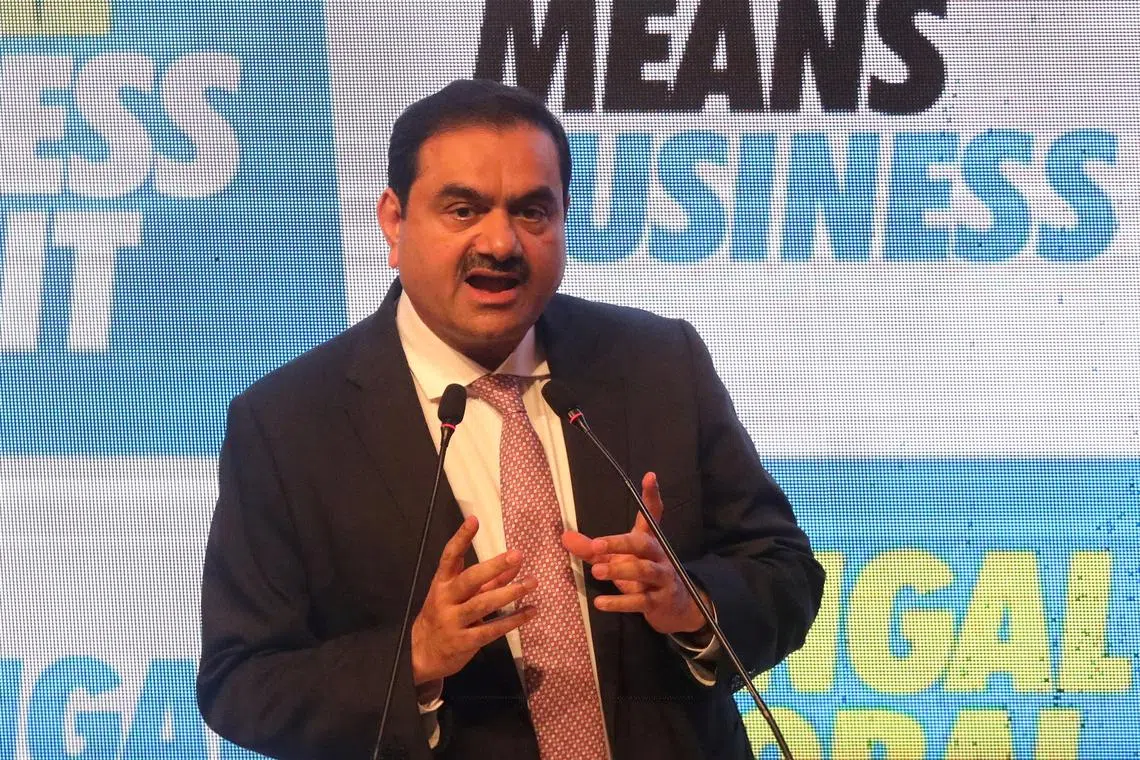Top India court clears Adani Group from more probes in Hindenburg saga
Sign up now: Get ST's newsletters delivered to your inbox

The year-long probe was triggered by a US short-seller that alleged widespread corporate malfeasance by billionaire Gautam Adani’s conglomerate.
PHOTO: REUTERS
Follow topic:
New Delhi – India’s Supreme Court ordered the country’s markets regulator to conclude its investigation into the Adani Group within three months and said no more probes were needed, in a reprieve for billionaire Gautam Adani, who cheered the verdict as the “truth” prevailing.
The three-judge bench on Jan 3 also urged the federal government to implement an expert panel’s recommendations to bolster the regulatory framework. But it did not go further, drawing a line, at least domestically, under a year-long saga triggered by United States-based short-seller Hindenburg Research, which alleged widespread corporate malfeasance by Mr Adani’s conglomerate.
The verdict “is in favour of Adani Group prima facie”, said Mr Kranthi Bathini, equity strategist at WealthMills Securities. While clarity is needed on pending probes from the Securities and Exchange Board of India (Sebi), he said the court had reiterated that scathing external reports against the group were “not triggers for an external investigation”.
The ensuing rally in the stocks of the group’s 10 listed firms added US$7.5 billion (S$10 billion), pushing its market value to US$181.5 billion – the highest level since Jan 27, 2023, according to calculations by Bloomberg. The combined market capitalisation is still more than US$50 billion short of the pre-Hindenburg level.
The ruling from India’s apex court comes after nearly a year of intense scrutiny for the ports-to-power conglomerate, which had repeatedly denied Hindenburg’s allegations of stock price manipulation and related party transactions, among other charges, in a bombshell report.
The short-seller’s broadside in January 2023 triggered a massive rout in Adani stocks and bonds, wiping out more than US$150 billion in equity market value at one point.
It also catalysed other damaging investigations, like one in August from the Organised Crime and Corruption Reporting Project, which identified potentially controversial share owners of Adani companies that had long-time business ties to the founders and had spent years trading hundreds of millions of dollars’ worth of Adani Group stocks. The conglomerate also rejected these allegations.
The group spent much of 2023 in damage control, which included paying down debts, assuaging investor concerns through roadshows across the world’s financial hubs, and scaling back its non-core businesses.
India’s top court in March ordered Sebi to probe Hindenburg’s allegations and submit the findings within two months. It also set up a six-member expert panel to assess if there were any regulatory lapses. The panel said in May no regulatory failures could be concluded nor was there any conclusive evidence of stock price manipulation by the conglomerate.
The verdict on Jan 3 asking Sebi to wrap up its investigation in three months marks a further extension after the regulator failed to meet the court-mandated deadline twice.
Sebi, which has struggled to get data from overseas agencies, told the Supreme Court in August that it had closed its probe in 22 out of 24 issues concerning the Adani Group. It is still looking into alleged violations of minimum public shareholding rules and trading activity in Adani stocks before and after the Hindenburg report.
From a legal and political perspective, the court ruling “is positive for the group” although final findings are still awaited, said Mr Shriram Subramanian, founder of InGovern Research Services. The conglomerate “needs to go further on corporate governance to attract a wider set of investors”, he said.
Even before the Supreme Court’s verdict, the Adani Group had been steadily regaining investor and lender confidence.
The conglomerate has secured investments from GQG Partners and Middle Eastern sovereign wealth funds, and funding from a US government agency, refinanced a US$3.5 billion loan and pledged US$100 billion in green energy investment.
“I don’t think anybody is worried about Hindenburg any more,” said Mr Abhay Agarwal, founder and portfolio manager at Piper Serica Advisors. “Investors’ focus is now on earnings and valuations of individual companies.”
BLOOMBERG

